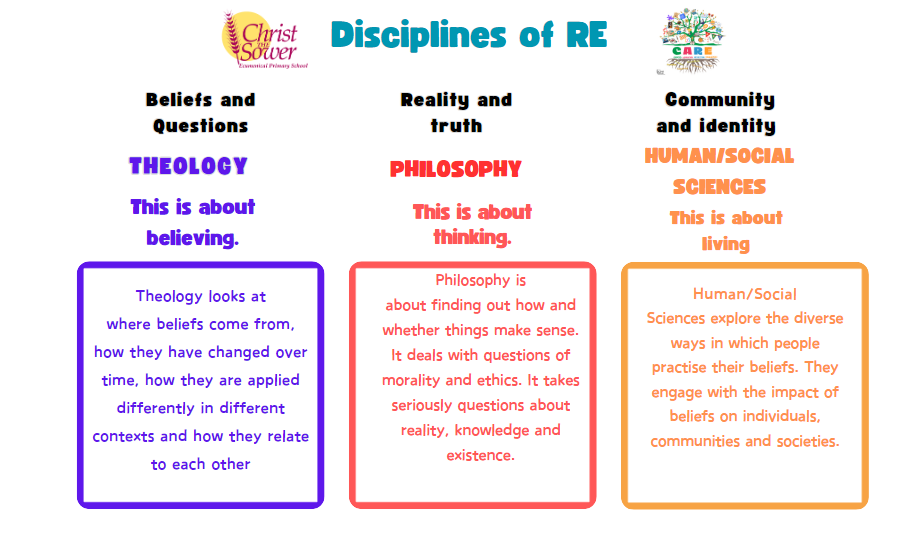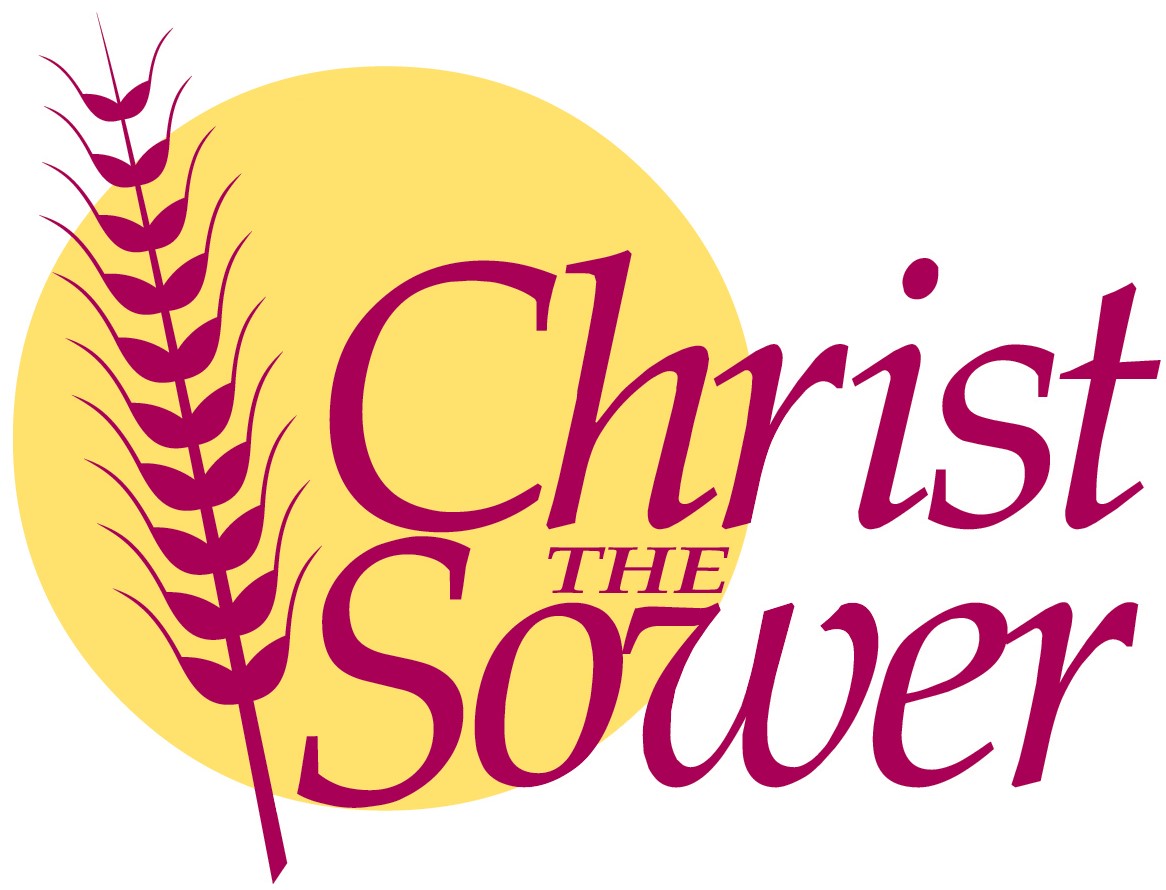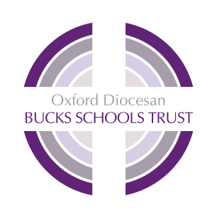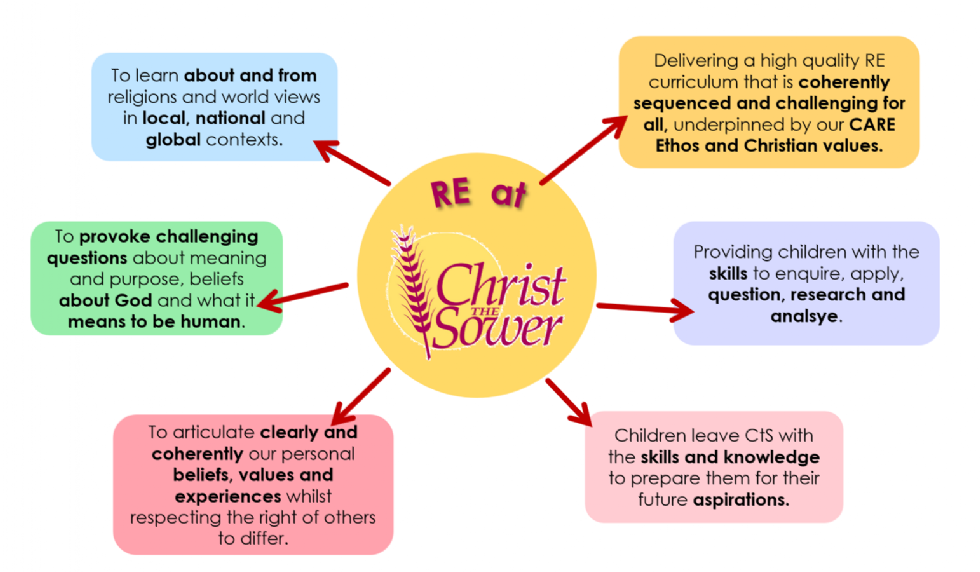RE
Curriculum Intent
At Christ the Sower Ecumenical Primary School, our Christian vision and CARE ethos are at the core of everything we do; we foster spiritual and moral development within a caring Christian community. We want all our pupils to flourish through the provision of high quality religious education.
Religious Education (RE) is an important way in which the school’s deeply Christian vision is expressed. In line with the Church of England Statement of Entitlement, we believe that every child should be enabled to flourish and live life to the full, by educating for dignity and respect and encouraging all to live well together.
Whilst we remain true to the Christian faith underpinning our Ecumenical School, we also have a deep respect for the integrity of other religious traditions and world views and for the religious freedom of each person in our school community. This is reflected in our RE curriculum and reflected in the vision and ethos of our school. We are very proud of our diversity, and we believe that we should celebrate it and learn from one another in a Christ-like way.
Our RE scheme of work is designed to give all pupils from EYFS through to Year 6 a coherent picture of Christian worldviews and a range of other appropriate worldviews in line with the agreed syllabus.
Units of work have been sequenced in a logical and coherent way, and are either taken from the Oxford Diocese RE Scheme of work 2023 or Understanding Christianity. We aim to cover a range of faiths, world views, concepts and ideas.
Our scheme will take pupils on a journey through a range of concepts driven by three core strands: Beliefs and questions, Community and identity and Reality and truth.
These strands will create connections between faiths, beliefs and world views and will include opportunities for the development of personal knowledge.
The aim is to develop curiosity in pupils and equip them for future learning about, as well as enabling them to make sense of, the complex world of religious and non-religious worldviews. Beliefs and questions will focus on theology, looking at the core beliefs and diverse interpretations of text, symbols and teachings of the chosen religions and worldviews. Community and identity will focus on Human and Social Science and using data and other sources to examine practices and human expressions of religious and non-religious beliefs. Reality and truth will focus on philosophy and ethics, looking at how people decide what is true and reliable, drawing on the worldviews covered in the other units.
There is the opportunity to study non-religious and other world views such as Baha’i and Buddhism within these units. It is in these units that pupils will have the opportunity to explore the wider concept of what a worldview is and how people reach these ideas.

Implementation
RE is a core subject with each class receiving a minimum of 1 hour each week (along with additional whole-school RE days during the school year, such as on John Wesley Day. Our rich and varied curriculum includes units on Christianity as well as other world religions and relates strongly to our multi-faith community, reflecting our local context. We aim to provide children with an understanding of what it means to have faith and to develop an informed opinion on beliefs and values.
Through effective curriculum planning and high-quality teaching, RE provision at CtS develops children’s religious literacy. It helps pupils know about and understand Christianity as a living world faith through the exploration of core theological concepts using an approach that critically engages with texts.
Being religiously literate enables children to:
- hold a well-informed conversation
- develop an aptitude for dialogue
- have greater awareness of the world in which we live
- develop their own views and opinions based on knowledge and understanding, with a respect that others will think differently to them
- understand, interpret and evaluate texts, sources of wisdom and authority and other evidence
- RE helps pupils to develop knowledge and understanding of other major religions and world views and their impact on society and culture.
- RE provides a safe space for pupils to critically reflect on their own religious, spiritual or philosophical convictions.
- RE is multi-disciplinary. Through a balance of these disciplines we empower children to have conversations that are informed.
Impact
Religious Education at CtS develops pupils’…
- knowledge and understanding of, and their ability to respond to, Christianity, other principal world religions, other religious traditions and world views;
- understanding and respect for different religions, beliefs, values and traditions (including ethical life stances), through exploring issues within and between faiths;
- understanding of the influence of faith and belief on individuals, societies, communities and cultures;
- skills of enquiry and response through the use of religious vocabulary, questioning and empathy;
- skills of reflection, expression, application, analysis and evaluation of beliefs, values and practices, and the communication of personal responses to these.
Religious Education at CtS encourages pupils to…
- consider challenging questions of the meaning and purpose of life; beliefs about God, the self and the nature of reality, issues of right and wrong and what it means to be human;
- understand the influence of religion on individuals, families, communities and cultures;
- learn from different religions, beliefs, values and traditions while exploring questions of meaning and their own beliefs;
- learn about religious and ethical teaching, enabling them to make reasoned and informed responses to religious, moral and social issues;
- develop their sense of identity and belonging, preparing them for life as citizens in a plural, global society;
- develop respect for and sensitivity to others, in particular those whose faiths and beliefs are different from their own.
Religious Education at CtS enhances pupils’…
- awareness and understanding of religions and beliefs, teachings, practices and forms of expression;
- ability to reflect on, consider, analyse, interpret and evaluate issues of truth, belief, faith and ethics and to communicate their responses.
Religious Education at CtS offers…
- opportunities for personal reflection and spiritual development.


